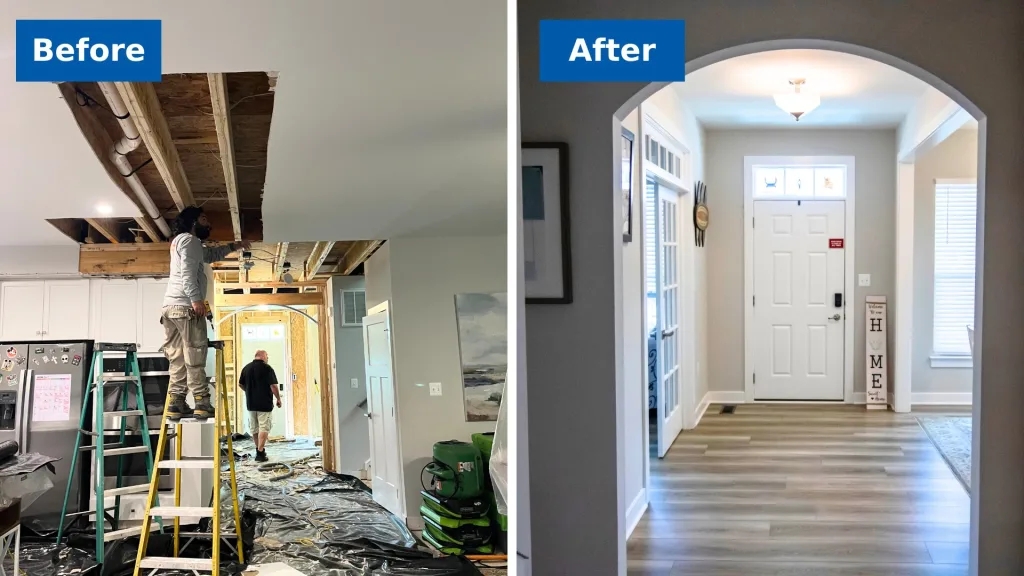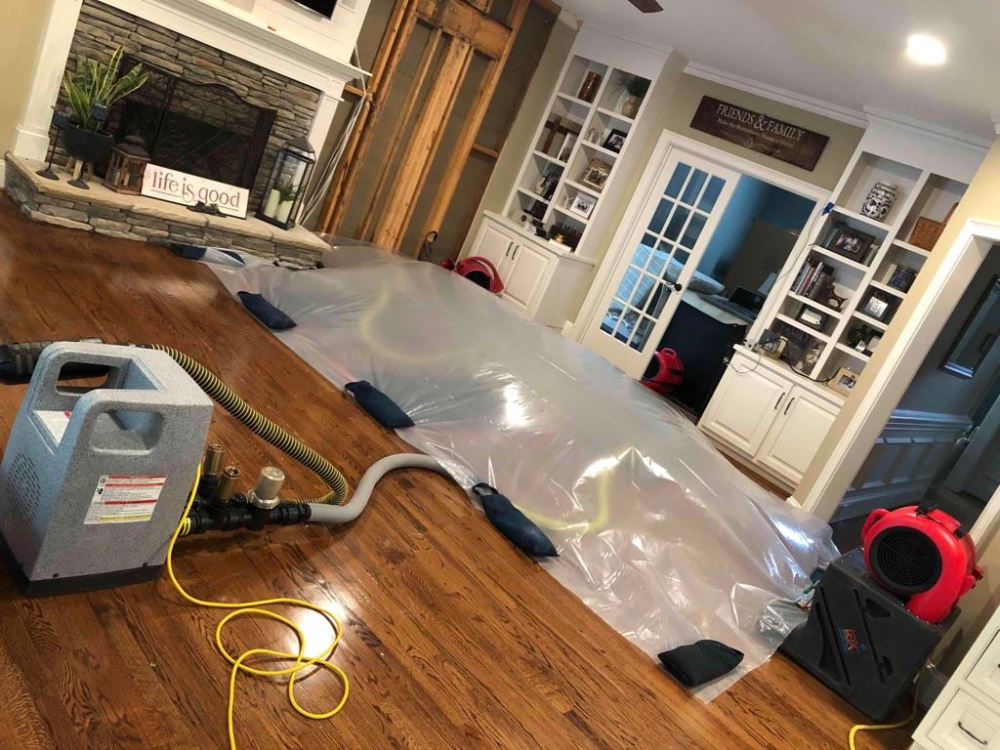The Do’s and Don’ts of Effective Water Damage Cleanup
The Complete Guide to Navigating the Challenges of Water Damage Remediation
Water damage can strike all of a sudden, leaving you with a challenging mess to tidy up. Recognizing the reasons and evaluating the extent of the damages is essential. Your immediate activities can make a substantial distinction in the outcome. Yet what steps should you take initially, and exactly how can you assure you're shielded moving on? The answers lie in a thorough strategy to reconstruction that every house owner ought to recognize.

Recognizing the Sources Of Water Damage
Water damages can strike suddenly, frequently leaving you clambering to address the aftermath. Understanding the causes of water damage is vital for avoidance. Smoke Damage Restoration. Common culprits consist of dripping roofings, burst pipes, or malfunctioning appliances. You might also come across problems with your pipes systems, like clogged drains pipes or sewage back-ups, which can bring about substantial water breach. Weather-related occurrences, such as hefty rainfalls or flooding, can additionally ruin your building. Furthermore, the age of your home plays a duty; older frameworks frequently have weakening products that are extra at risk to leaks and damage. Also small problems, like condensation from a/c systems, can collect and trigger problems gradually. By determining these prospective resources of water damage, you can take positive steps to secure your home and lessen future dangers. Staying educated will equip you to acknowledge early signs and act swiftly when issues develop
Assessing the Level of the Damages
Evaluating the extent of the damage is vital for establishing the proper feedback as soon as you've recognized a potential water damages issue. Begin by checking the impacted locations thoroughly. Seek visible signs like water discolorations, distorted floors, or peeling off paint. Do not neglect to inspect hidden spots, such as behind walls or under carpetings, where dampness could linger.Next, determine the kind of water involved-- tidy, grey, or black-- because this influences the seriousness of the damage and essential remediation steps. Utilize a moisture meter to measure humidity degrees in floors and wall surfaces, helping you determine remaining dampness that might bring about mold growth.Document everything with images and notes, as this details can be vital for insurance coverage cases. By properly reviewing the damage, you'll be better outfitted to choose the right reconstruction strategy and protect against more concerns down the line.
Immediate Steps to Take After Water Damages
After experiencing water damages, the very first point you require to do is evaluate the situation very carefully. Prioritizing your safety and security is essential, so see to it the location is safe before taking any kind of additional steps. Don't neglect to record every little thing completely, as this will be very important for insurance coverage cases and remediation initiatives.
Evaluate the Damages
Assessing the damage rapidly is important for reducing the impact of water invasion. Begin by examining the influenced locations to determine the extent of the water damage - Flood Damage Restoration. Look for noticeable indications like soaked carpetings, warped floorings, and stained walls. Look for concealed water, also, especially in crawl areas and behind home appliances. Make use of a moisture meter if you have one, as it can help pinpoint locations that need attention. Document whatever with images and notes; this will certainly serve for insurance claims. Bear in mind to examine your items too-- furniture and personal things may require expert cleansing or disposal. By recognizing the extent of the damage, you can make informed decisions about the following action in the remediation procedure
Focus On Safety And Security First
Recognizing the extent of water damages is just the beginning; your safety and security comes first. Before you get in a water-damaged area, make sure to switch off the electrical power and gas supply to avoid any threats. Put on protective gear, including boots and gloves, to protect on your own from pollutants. Beware of structural instability-- floorings, ceilings, or walls may have weakened. If the water is originating from a sewage resource, prevent contact and telephone call specialists for aid. Maintain kids and animals far from the affected location. Evacuate instantly if you scent gas or see electrical stimulates. Keep in mind, prioritizing your security assurances you can effectively address the damage without threat to your health. Always err on the side of caution.
Record Everything Thoroughly
As you start addressing water damages, recording everything completely is important for both insurance claims and remediation efforts. Begin by taking clear pictures of the impacted locations, catching the extent of the damage. Make certain to keep in mind the day and time of the event. Create a list of harmed things, consisting of furniture, home appliances, and personal items, in addition to their estimated worths. Tape-record any activities you take, like calling specialists or relocating items to protect against more damages. Keep all invoices and invoices associated with the repair procedure. This paperwork will certainly enhance your situation when suing and assist the repair team understand the situation much better. Bear in mind, thorough documentation can make a considerable distinction in your recovery trip

Mitigating Further Problems and Protecting Against Mold and mildew Growth
When water damage takes place, acting rapidly can considerably decrease the risk of additional issues, particularly mold development. First, remove any standing water using pumps or damp vacuum cleaners. Next, dry the affected areas extensively. Open windows, make use of followers, and take into consideration dehumidifiers to quicken the drying procedure. Go for a moisture level listed below 60% to prevent mold spores from settling.Inspect all surfaces and materials impacted by water; dispose of anything that can't be sufficiently dried, like drenched carpetings or drywall. Clean and decontaminate staying surface areas with a blend of water and cleaning agent, or a specialized mold-preventive solution.Keep an eye on the area over the next couple of weeks. Address it promptly if you see any stuffy scents or discoloration. Keep in mind, timely activity not only prevents mold and mildew development but likewise safeguards your residential or commercial property and health.
Functioning With Water Damages Repair Specialists
After taking instant actions to alleviate water damage and protect against mold development, it's time to consider specialist help. Water damages remediation specialists have the know-how and devices required to handle comprehensive damages efficiently. Be prepared to define the situation in information when you reach out. This aids them examine the seriousness of the damages and prepare accordingly.Once they show up, expect an extensive inspection and a thorough plan for restoration. They'll use specialized tools to remove water, completely dry out impacted areas, and sanitize your area. Do not think twice to ask inquiries throughout the procedure; understanding their techniques can relieve your concerns.You must additionally discuss timelines and what to anticipate at each stage of the remediation. Working together freely with these experts assurances you remain educated and entailed, assisting you restore your space extra effectively. Depend on their knowledge, and you'll see your home go back to its pre-damage problem.
Navigating Insurance Insurance Claims for Water Damage
Steering insurance cases for water damages can feel frustrating, specifically if you're unfamiliar with the process. Assess your insurance policy to understand what's covered. Seek specifics on water damage, as not all plans treat it the exact same. Record the damages thoroughly-- take pictures and make notes concerning what happened and when.Next, contact your insurance policy service provider immediately. Record the damage and provide them with your documentation. They'll appoint an insurance adjuster to evaluate the circumstance. Be prepared to address inquiries and provide added information as needed.Stay arranged throughout the process. Keep a record of all interactions, consisting of days, names, and information of conversations. Don't think twice to appeal if your claim is refuted or you feel it's insufficient. Know that persistence can settle, so supporter on your own to guarantee you obtain the protection you're qualified to.
Tips for Future Water Damages Avoidance
To maintain your home secure from water damages, regular upkeep checks are vital. Don't ignore the value of setting up water detection systems, as they can signal you to leaks before they become major problems. By remaining positive, you can save yourself time, money, and stress and anxiety down the road.
Regular Maintenance Checks
While it could seem laborious, carrying out normal upkeep checks can considerably decrease the danger of future water damages in your home. Beginning by evaluating your roof for missing leaks or roof shingles; even little issues can escalate swiftly. Examine gutters and downspouts to guarantee they're clear and routing water far from your foundation. Try to find indicators of dampness in cellars or crawl areas, and address any leaks from appliances or pipelines immediately. Bear in mind to evaluate your sump pump regularly to verify it's working effectively. Don't ignore your cleaning device hoses; replace them every few years to avoid burst disasters. By remaining aggressive with these checks, you'll save yourself time, money, and stress in the future.
Install Water Discovery Systems

Regularly Asked Questions
For how long Does the Water Damages Remediation Process Usually Take?
The water damage reconstruction procedure generally takes anywhere from a few days to a number of weeks, relying on the extent of the damages. You'll intend to act rapidly to minimize additional problems and quicken the process.
Can I Stay in My Home Throughout the Repair Process?
You can stay in your home throughout the repair procedure, however it depends upon the degree of the damages. If it's severe, it's more secure to briefly relocate until the work's finished and your home's safe.
What Individual Products Can Be Salvaged After Water Damage?
After water damage, you can often restore products like clothes, books, and electronic devices, given they're not saturated or moldy. Always evaluate their problem swiftly and get in touch with professionals for advice on repair and security.
Are There Any Type Of DIY Methods for Recovering Water-Damaged Things?
Yes, you can utilize do it yourself approaches to recover water-damaged items. For furniture, air-dry and use a timber conditioner. For fabrics, clean them thoroughly and air-dry. Always check for mold before trying any type of restoration.
How Can I Recognize Hidden Water Damage in My Home?
To determine hidden water damages, check for water stains on ceilings and wall surfaces, pay attention for dripping sounds, feel for moisture in materials, and examine areas near plumbing for indicators of mold or mold development. Once you've recognized a possible water damage concern, evaluating the level of the damage is necessary for establishing the proper reaction. As you start dealing with water damages, recording whatever thoroughly is essential for both insurance cases and reconstruction initiatives. Water damage repair experts have the experience and equipment needed to take care of substantial damage successfully. Installing water detection systems can be a game-changer for stopping future water damage in your home. The water damage repair procedure normally takes anywhere from a few days to several weeks, depending on the degree of the damage.